Berlin (CNN) The man suspected of deliberately ramming a large truck into a Christmas market in Berlin is a refugee from the Afghanistan-Pakistan region, two German intelligence officials and a police official told CNN.
The sources said the suspect in Monday evening's attack, which killed 12 people and injured dozens more, arrived in Passau, a city on Germany's border with Austria, on December 31, 2015, after traveling through the Balkans.
German Chancellor Angela Merkel held a press conference on Tuesday saying it would be "especially disgusting" if the suspect turned out to have been given asylum in Germany.
Latest developments
- Security officials say truck driver is from Afghanistan-Pakistan region
- Merkel says incident is being treated as a terror attack
- Case has been handed to German federal police and public prosecutor
- A second man found dead in truck was Polish, not at wheel when crash occurred
- At least 48 people hospitalized when the truck hit the crowd
- Victims yet to be formally identified, no names released
Berlin police said that the truck "was steered deliberately into the crowd." It was carrying 25 tons of steel at the time, the vehicle's owner said. The truck that devastated the Breitscheidplatz market is owned by a Polish company. Ariel Zurawski, owner of the truck company, said it may have been hijacked as his cousin the truck's regular driver couldn't have been behind the wheel. It was being used to transport steel.
"My scenario is that they did something to him and hijacked this truck," Zurawski told CNN affiliate TVN 24. He said that his cousin's wife had attempted to phone him multiple times but was unable to get through. Berlin police said a man found dead in the truck was a Polish citizen. He was not at the wheel during the incident. Police said another man, apparently the driver, was picked up just over a mile from the scene and is being treated as a suspect.
Merkel: 'Heard to bear'
Speaking on Tuesday, Merkel said the incident was assumed to be a terror attack but did not confirm the suspect's identity. "I know that it would be especially hard to bear for us if it was to be confirmed that a person (who) committed this act ... was given protection and asylum in Germany," she said. Monday's attack could cause further political upheaval for Merkel, who has come under criticism over her government's generous acceptance of refugees. Germany has taken in more than 890,000 asylum seekers in the past year, a marked difference to other European nations.
'It felt like slow motion'
At Breitscheidplatz on Monday evening it was a quintessential German Christmas scene: Trees strung with lights, vendors serving candied fruit and waffles, the smell of gluhwein German mulled wine wafting through the cold December air. Shoppers were milling around buying snacks and gifts in the final days before the holiday at the colorful market, set up at the foot of an old church. American Shandana Durrani was at the market and had stopped to reply to a text message when the truck rammed into the crowd at around 8 pm.
She was lucky to have stopped, she said, as the truck mounted the curb, mowing people and stalls down just 20 feet in front of her, sending the crowd "running, scurrying, screaming." "I heard some popping and thought maybe there was a guy with a gun," she told CNN.
"People just started running and dropping their gluhwein." She said that the it looked as if the driver had just mounted the curb and lost control, and that the whole thing probably lasted a mere 10 seconds. "It probably didn't last very long, but it felt like it was in slow motion (as I ) tried to get away from it."
Security concerns
Comparisons have been drawn with an attack in Nice, France, in July. In that incident, a truck rammed into a crowd gathered to see Bastille Day fireworks, killing 86 and injuring more than 200 people. Terror groups including ISIS and a branch of Al Qaeda have encouraged their followers to use vehicles to stage attacks.
Prior to Monday's attack, both the US and UK governments had warned their citizens of potential security threats in Germany. "There is a high threat from terrorism," according to UK foreign travel advice. "Attacks could be indiscriminate, including in public places visited by foreigners."
The US had issued a blanket travel warning for Europe, saying there was "credible information (which) indicates terrorist groups continue plotting possible attacks."
German officials had also expressed concerns over security for Christmas markets, which are often frequented by large crowds.
Political repercussions
German police have declined to confirm to CNN the driver's motivations or his background.
However, this has not stopped some attributing blame.
US President-elect Donald Trump quickly linked the incident to "ISIS and other Islamist terrorists" and "global jihad."
"For Chancellor Merkel (Monday's attack) is an absolute nightmare," Dominic Thomas, professor of French at UCLA, told CNN.
"It feeds into the discourse of (far-right party) Alternative fur Deutschland, which has been trying to shape the conversation precisely around these types of events."
David Andelman, author of "A Shattered Peace: Versailles 1919 and the Price We Pay Today", said that many Europeans are coming to fear that traditional democratic values are only giving aid and comfort to terrorists, leading to a swell in support for more authoritarian politics.
"Across Europe, right-wing candidates are positioning themselves against immigration and Islam, defending an ever-tougher stance with every new terrorist assault," he said.
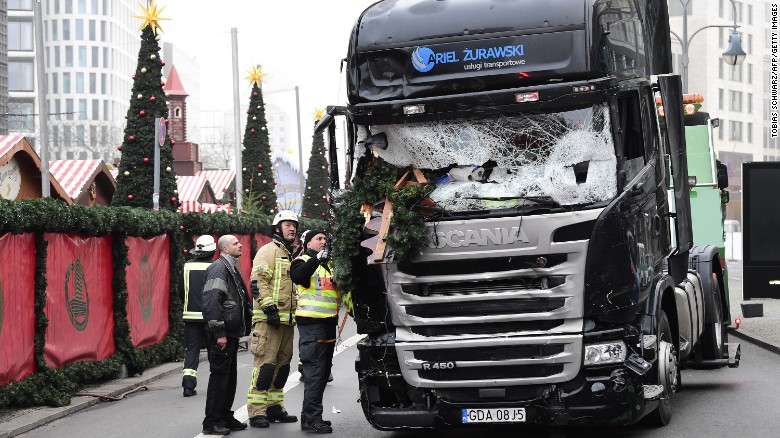
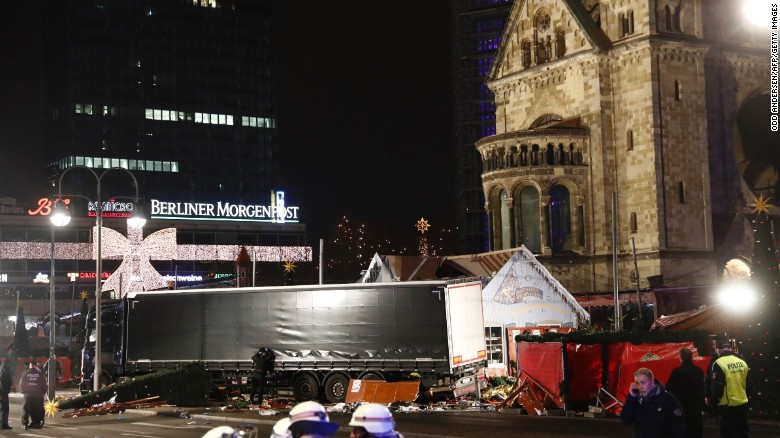
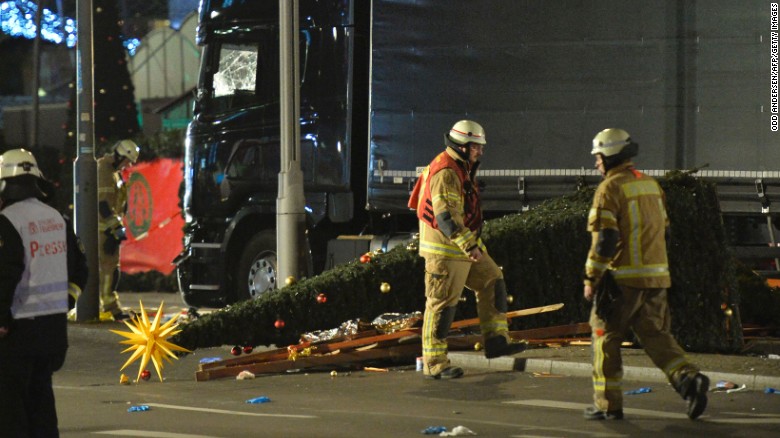
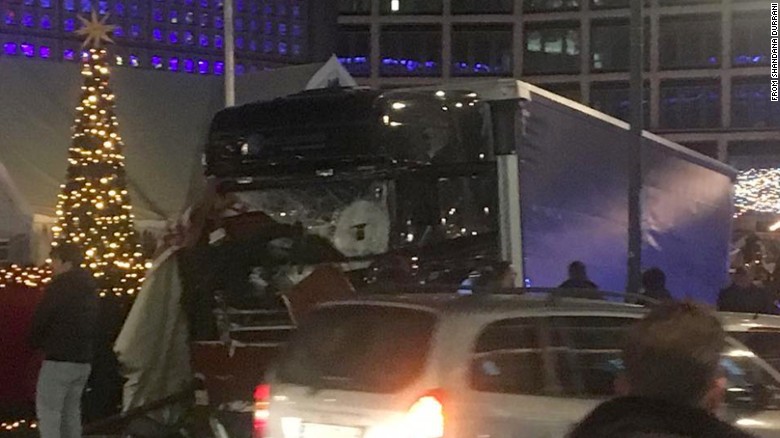
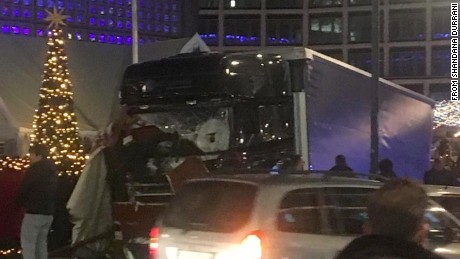
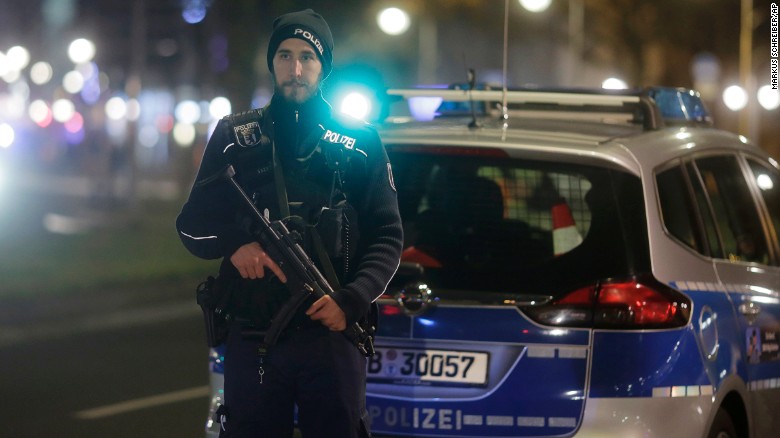
No comments:
Post a Comment